Caring for the community, especially the vulnerable sections, is an integral component of the Aditya Birla Group's operations and reflects a commitment that goes much beyond business excellence.
Through the decades, we have been deeply invested in empowering local communities across India. Beneficiaries in far flung and remote areas have been touched through a wide span of projects that align with the UN Sustainable Development Goals.
The Aditya Birla Centre for Community Initiatives and Rural Development, chaired by Mrs. Rajashree Birla, oversees the Group's corporate social responsibility (CSR) initiatives.
Driven by Dr. Pragnya Ram, these initiatives are supported by UltraTech Cement's Shiv Santra, Hindalco Industries' Bipul Chatterjee, Grasim Industries' Satish Bhuvir, Aditya Birla Capital's Gopal Kumar, Aditya Birla Fashion and Retail's Dr. Naresh Tyagi and Vodafone Idea's Dr. Nilay Ranjan, along with more than 200 qualified and dedicated professionals at these companies. In addition, the efforts of around 1,500 community members on the ground are especially critical to the success of our CSR projects.
The Group's social vision has always been deeply embedded in its business vision. Here are some glimpses of our work in 7,000+ villages, where we reach out to nine million people across the country:
Addressing poverty and malnutrition
Alleviating poverty has been an unrelenting battle at the Group for decades. Across the country, our CSR work has made a difference to the extent that the percentage of families below the poverty line has dropped significantly. We work in collaboration with the government, non-profit organisations, communities and other stakeholders. Our holistic developmental model focuses on five critical areas — education, healthcare, sustainable livelihood, infrastructure development, and social reforms.
Any improvements in these areas can make a life-changing difference to those living on the economic fringes of society. Our model to address poverty and malnutrition has helped promote sustainable agriculture, support small-scale farmers with access to land, technology and markets, and has enabled beneficiaries to access existing government welfare schemes.
Growing our healthcare outreach
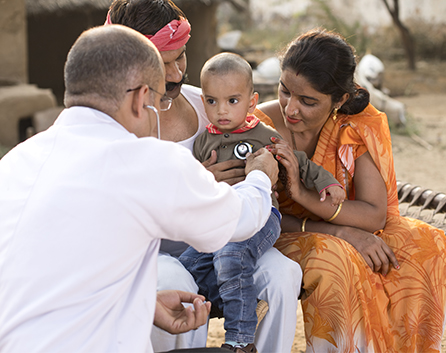
With many of our manufacturing facilities located at non-urban or remote areas, the Group's businesses have been able to improve access to healthcare for communities in the plants' vicinity. During the ongoing Covid-19 pandemic, this pan-India network has helped deliver relief measures to thousands of deserving people.
Our healthcare projects span hospital access, mobile health camps, immunisation programmes, cancer care, intense mother and childcare projects, post-natal care for babies, care for children with severe illnesses, ambulance services and more, to impact over a million people across India.
Here are some glimpses of the work done by Group companies in delivering healthcare to communities around their plants:
Grasim
- 353,000+ people covered through healthcare projects
- 447 camps held for health check-ups, eye care, dental, and tuberculosis detection, among others
- 6,200+ women supported through pregnancy, delivery and post-natal care
- 100,088 children immunised against polio, BCG, DPT and Hepatitis-B
Hindalco
- 700,000+ people covered through various healthcare programmes
- 2,000 healthcare camps organised
- Supported two hospitals, 17 dispensaries and nine primary health centres
- 30,900+ women supported through pregnancy, delivery and post-natal care at the company's 26 family welfare centres
- 175,723 children immunised against polio, BCG, DPT and Hepatitis-B
UltraTech
- 400,000+ people covered through healthcare programmes
- 7,700+ women supported through pregnancy, delivery and post-natal care
- 133,243 children immunised against polio, BCG, DPT and Hepatitis-B
Aditya Birla Capital
- 25,000+ women supported through pregnancy, delivery and post-natal care
- 49,000+ women benefited from improved labour facilities in 25 PHCs
- 600 underprivileged patients benefited from a fully-equipped operation theatre in a community hospital
- 1,508 children provided with chemotherapy and cancer care
- 4,000 girls administered the HPV (human papillomavirus) vaccine against cervical cancer
Aditya Birla Fashion and Retail
- 100,000+ healthcare beneficiaries across 67 villages
- 636 women supported through eight cancer screening camps
- 10 community eye camps organised
- 15,900+ people covered through health awareness camps
- 845 people underwent general health check-ups and received unique medical IDs under the E-Healthcare Project
Making education accessible
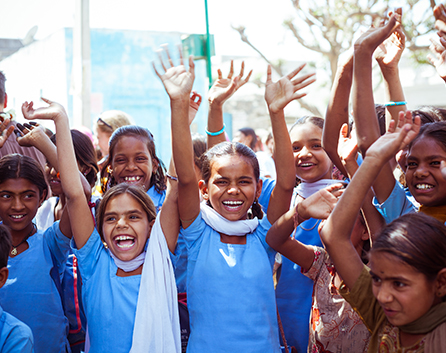
By engaging at both institutional and local levels, we aim to strengthen India's education ecosystem and ensure that more children across the country can participate in learning activities.
We have established a network of 56 schools across our plant locations where 46,500+ students study. The Group also strengthens the education ecosystem by rebuilding dilapidated school buildings, providing scholarships for meritorious students, and facilitating digital literacy and remedial classes. We ensure midday meals for 70,000+ children, enrol young children for early childhood education in local anganwadis, and support education for thousands of girls through the Kasturba Gandhi Balika Vidyalaya system.
Here is a snapshot of how our companies have worked in the area of education and literacy:
Grasim
- 1,371 girls supported in education through Kasturba Gandhi Balika Vidyalayas
- 1,248 students enrolled in digital literacy programmes
- 1,513 children enrolled in anganwadis
- 6,349 students enrolled in six Aditya Birla Public Schools
- 19 school buildings upgraded
Hindalco
- 1,000+ girls supported in education through Kasturba Gandhi Balika Vidyalayas
- Five science laboratories set up at government high schools
- 800 children enrolled in anganwadis
- Three school buildings built, and 13 school buildings repaired
UltraTech
- 1,500+ girls supported in education through Kasturba Gandhi Balika Vidyalayas
- 3,600+ students from 300 schools enrolled in digital literacy classes
- 9,500 children enrolled in anganwadis
- 986 students attended remedial and special coaching classes
Aditya Birla Capital
- 362 children with special needs enrolled in an Inclusive Child Resource Centre
- 6,300 students in 42 government schools benefited through upgraded learning facilities
- 10,000+ children benefited from refurbishing of 25 anganwadis and 28 primary schools
- 119 girls provided scholarships to pursue studies in engineering, nursing and pharmacy
Aditya Birla Fashion and Retail
- 5,233 students benefited from school transformation project in 11 schools
- 1,094 students enrolled for coaching classes for competitive exams
- 5,754 rural girl students supported in higher studies in the last seven years
- 2,368 students joined library programmes
- 1,460 notebooks distributed to 830 underprivileged students
- 943 students supported for computer literacy classes
Making rural livelihoods sustainable
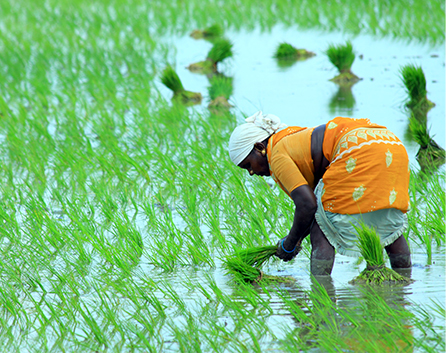
As a responsible business group, ensuring water conservation and harvesting has been among our most important goals, especially since water is the lifeline for agriculture. The Group supports several farm-based interventions, including improved agricultural techniques and animal husbandry management, to take us closer to the goal of sustainable agriculture and farm-based livelihoods.
Notable water and farm-based interventions by our Group companies are:
Grasim
- 14,500+ farmers benefited from irrigation support
- 50 million cubic feet of water conserved through five check dams and 23 ponds
- 97 vermicompost tanks set up to encourage organic farming
- 6,480 cattle owners supported through veterinary camps for cattle immunisation and artificial insemination
- 70 per cent improvement in milk yields
Hindalco
- 50,000+ farmers benefited from irrigation support
- 223,000+ cubic metres of water conserved through 83 check dams and 118 ponds
- 100 vermicompost tanks set up to encourage organic farming
- 40,000 cattle owners supported through veterinary camps
- 200 farm families benefited from training at the Aditya Birla Rural Technology Park in Muirpur, Uttar Pradesh
UltraTech
- 50,000+ farmers benefited from irrigation support
- 1.25 million cubic metres of water conserved through 152 check dams and 48 ponds
- 23,000 farm families benefited from veterinary camps
- Knowledge collaboration with NABARD, MYRADA, ICRISAT, AFPRO and Aide et Action
Aditya Birla Capital
- 540,000+ cubic metres of water harvest potential created through 131 water harvesting structures
- 3,000+ farmers benefited through water recharge activity on 1,600 hectares of land
- 16,000 farm households became self-sufficient in food
- 6,166 families benefited through improved farm earnings
- 11,300 women in tribal belts provided with earning facilities through lac-making and animal husbandry activities
Aditya Birla Fashion and Retail
- 31,910 kilolitres of water conserved through the watershed programme
- 13,550 people benefited from water-based programmes
Providing access to clean water and sanitation
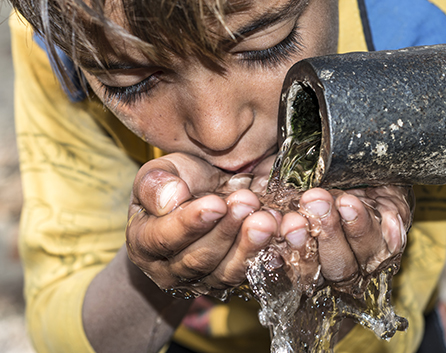
Access to water for community use is imperative from a hygiene and health perspective. Our companies enable access to water by installing Reverse Osmosis (RO) plants, borewells and pipelines, water tanks, and doorstep water facilities. With the construction of toilets and proper sanitation facilities, over 95 per cent of the villages near our manufacturing facilities have been declared open-defecation free.
Some of the key highlights of the work done by Aditya Birla Group companies in the area of water and sanitation are:
Grasim
- 25 Reverse Osmosis (RO) plants installed till date
- 97,050 villagers provided with access to water through pipelines and borewells
- 1,490 individual toilets and sanitation facilities constructed
Hindalco
- 27 Reverse Osmosis (RO) plants installed till date
- 76,000+ villagers provided with access to water through pipelines and borewells
- 1,652 individual toilets and sanitation facilities established or facilitated
UltraTech
- 29 Reverse Osmosis (RO) plants, 24 handpumps, and two solar-based and seven gravity-based drinking water systems installed
- 85,000+ villagers provided with access to water through pipelines and borewells
Aditya Birla Fashion and Retail
- Water ATMs in villages and in rural and semi-urban slums across Karnataka and Tamil Nadu established
- 23,300 water ATM users now access good quality potable water
Promoting gender equality
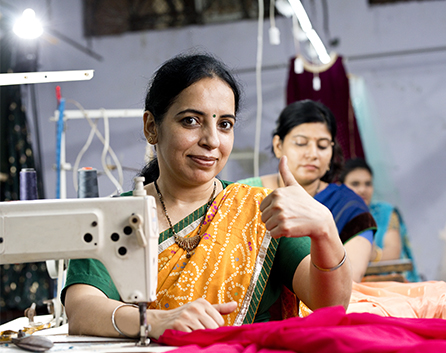
Our companies encourage women to form self-help groups (SHG) and engage in other economic activities for income generation. As a result, thousands of women from rural and underprivileged communities have experienced financial independence and a better quality of life. In Chhattisgarh, for instance, Hindalco's Kosala Livelihood and Social Foundation supports the local traditional art of weaving Kosa silk sarees and textiles through contemporary design and market linkages.
Here are some of the key achievements in the area of women empowerment by our Group companies:
Grasim
- 390 SHGs comprising 5,165 women supported through livelihoods
- 400,000 face masks produced
- Production of 200,000 jute bags, 600 uniforms, 3,000 garments and more facilitated
Hindalco
- 2,000 SHGs comprising 24,860 women supported through livelihoods
- 35 women encouraged to revive the traditional weaving of Kosa silk textiles
UltraTech
- 840 SHGs comprising 8,000+ women supported through livelihoods
- 367,000+ women impacted positively
Aditya Birla Capital
- 3,070 women in 240 SHGs trained for formalised banking and entrepreneurship
Improving infrastructure
Making lives better has been the core premise for our infrastructure development projects in the communities residing around our manufacturing plants. This includes ensuring better transport connectivity, road repairs, building community halls, parks and resting avenues, installing solar lights, constructing water tanks, and installing piped water supply systems.
Our Group companies' infrastructure development interventions have yielded the following results:
-

26,229 beneficiaries
Grasim -

83,430 beneficiaries
Hindalco -

278,012 beneficiaries
UltraTech -

2,084 beneficiaries
Aditya Birla Fashion and Retail
Skilling for employment
Our Group companies work with local communities to extend skills and vocational training that helps thousands of youngsters with employment prospects. These skilling initiatives cover both the farm and non-farm sectors. Hindalco also supports the Aditya Birla Rural Technology Park at Muirpur in Sonbhadra district of Uttar Pradesh, and the Aditya Birla Skills Foundation at Dhanupali in Sambalpur district of Odisha.
Skilling interventions by our respective Group companies have impacted the following numbers of youth:
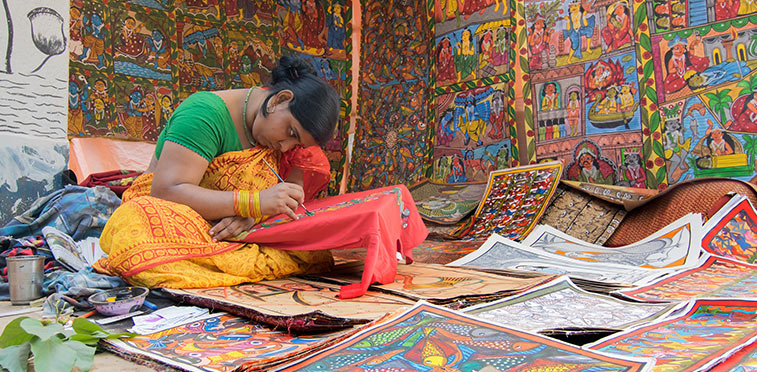
-

8,664 people
Grasim -

3,541 people
Hindalco -

6,347 people
UltraTech -

2,599 people in the last seven years
Aditya Birla Fashion and Retail
Building model villages
This has been among our toughest challenges yet. As part of our efforts in this area, we work to transform villages into model villages that are self-reliant in all aspects – education, healthcare and family welfare, infrastructure, agriculture and watershed management, and sustainable livelihood opportunities.
This project involves conducting impact assessment studies through external agencies to evaluate the change achieved in these villages. While focusing on solutions for overall development, we have also tackled social issues that include female foeticide and girl child issues, child marriage, dowry, women in abject subjugation, and alcoholism and livelihood problems.
In these model villages, the Group has been able to achieve a 100 per cent of, among other things, institutional deliveries, girl child education, zero school dropouts and complete enrolment in schools for children.
Key impact numbers by Group companies are as follows:
-

Grasim:
Works with 50 villages; 30 villages transformed till date
-

Hindalco:
Works with 102 villages; 35 villages transformed till date
-

UltraTech:
Works with 100 villages; 44 villages transformed till date
-

Aditya Birla Fashion and Retail:
Works with 11 villages; 3 transformed till date
An ongoing journey
Through its bouquet of CSR initiatives, the Aditya Birla Group has strived to make a life-changing difference for rural and underserved communities, especially for those from vulnerable sections of society.
Our Group companies have aimed to lift the burden of poverty for people from such communities through a holistic approach, eventually moving them from dependency to self-reliance. This will continue to be our larger guiding philosophy as we intensify our efforts to build a better and more equitable life for all.

